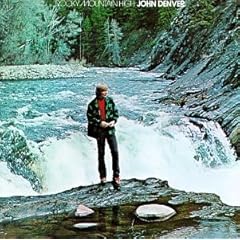 I like his music (though I can burn out on it easily), and I like his lyrics, but sometimes the contradictions drive me nuts. Most evident is in one of his most famous songs, "Rocky Mountain High". Most of the song is a celebration of a guy who wasn't born in the country, and discovered that was where he belonged when he visited there.
I like his music (though I can burn out on it easily), and I like his lyrics, but sometimes the contradictions drive me nuts. Most evident is in one of his most famous songs, "Rocky Mountain High". Most of the song is a celebration of a guy who wasn't born in the country, and discovered that was where he belonged when he visited there.He was born in the summer of his 27th yearThe song goes on at some length about the transformative power of the wilderness on this man who discovered that this is where he always belonged. And yet, once this theme is very firmly established and very clearly positioned as a good thing, John concludes:
Coming home to a place he'd never been before
He left yesterday behind him, you might say he was born again
Now his life is full of wonder but his heart still knows some fearHey John, guess what. Maybe the answer is in the whole rest of the song you just wrote. So make up your mind. Is it a bad thing to "bring in a couple more" or isn't it?
Of a simple thing he cannot comprehend
Why they try to tear the mountains down to bring in a couple more
More people, more scars upon the land
The least cynical answer I can think of, which is still very elitist, is "sure, but only if they're the right people, the people who will turn out to have belonged there all along." But how do you tell who those people are? Your song just explained that he had to go there and see it for himself to know.
A more cynical and probably more accurate answer is this: "they should let more people in until I get there, and then close the door, to preserve what I just got." And this seems to be the unspoken (sometimes spoken!) assumption behind so many of the elitist attitudes I see to "outsiders" coming into the wilderness.
The unavoidable fact is that the real problem is overpopulation. But that's too big a topic to put into this post.

 RealTime and RTC
RealTime and RTC Prism
Prism Uncreated
Uncreated Bloodweavers
Bloodweavers Foulspawner's Legacy
Foulspawner's Legacy Lusternia
Lusternia
1 comment:
A more cynical and probably more accurate answer is this: "they should let more people in until I get there, and then close the door, to preserve what I just got." And this seems to be the unspoken (sometimes spoken!) assumption behind so many of the elitist attitudes I see to "outsiders" coming into the wilderness.
I think this is the answer, unfortunately. People would phrase it more like your generous hypothesis, but it usually means this.
The unavoidable fact is that the real problem is overpopulation.
I take issue with this, actually. I maintain that we should use "overpopulation" in a pretty strict sense, and humans are nowhere close to that yet. Earth holds immense spaces of livable land with a low human population. If the question is, "Do we have the land and resources to grant the current human population access to 21st-century levels of resources AND maintain wild spaces," the answer is of course "no." I think that's a separate, though important, question from overpopulation itself.
Post a Comment